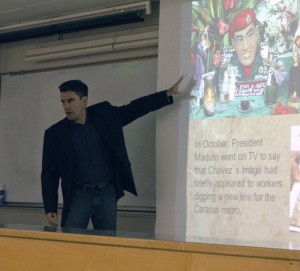
Hugo Chávez, the former populist president of Venezuela and supporter of Geo-political unity among South American nations, died one year ago today.
Over the past several weeks, the Venezuelan government has reported the death of 18 people as a result of protests against the regime of Chávez’s successor Nicolas Maduro, as reported by the Associated Press.
Amid the protests, there is uncertainty of whether Nicolás Maduro, the heir to the presidency and the “Chavismo” political movement informed by Chávez’s policies, can endure in the wake of the former president’s death.
Chico State history professor Stephen Lewis presented a lecture addressing this question in Ayres Hall yesterday and discussed how Chávez’s legacy has impacted the current situation in Venezuela.
Venezuela’s domestic natural resources gave Chávez a unique opportunity among the region’s historical leaders, Lewis said.
“Populist leaders in Latin America come and go,” Lewis said. “But never before was a populist leader sitting on the largest probable oil reserves in the world.”
Chávez implemented a variety of public services, he said. In addition, he was able to use the country’s wealth in natural resources to galvanize a collaborative economic structure in South America through the Organization of Petroleum Exporting Countries and the Bolivarian Alliance for the Peoples of Our America.
The roots of the protests lie in a decade-long history of opposition to Chávez’s regime, Lewis said.
Chávez faced several attempts to unseat him from the presidency starting in 2002. These included a coup which ended before two days had passed, an attempt to privatize the country’s oil industry and a referendum posed in 2004 with the intentions of forcing him to step down through a popular vote.
This same opposition is the force behind the current protests, Lewis said. One chief complaint for the protesters, who consist primarily of rich and middle-class Venezuelans and some university students, include a lack of basic necessities being available.
“Basic goods are in short supply,” he said. “Toilet paper has been a problem for several months.”
Maduro won a narrow victory for the presidency by appealing to Chávez’s political base, Lewis said. His campaign revolved around using the cult of personality that has developed around Chávez since his death, including the claim that the late president has communicated to him since his death.
The protests along with diminished political support for Madero is indicative that Venezuela may be on the verge of a significant shift in political and social sensibilities, he said.
“It’s been suggested that the ‘pink tide,’ this leftist surge, may be turning,” Lewis said, regarding the push against Chavismo influences sought by the government’s opposition.
If the current regime in Venezuela falls, the oil security of neighboring countries and the future of the South America’s free trade organization could be in question, Lewis said.
“If Maduro falls or the Chavistas fall, that could have huge implications,” Lewis said.
Nicholas Carr can be reached at [email protected] or @nikecarr on Twitter.








